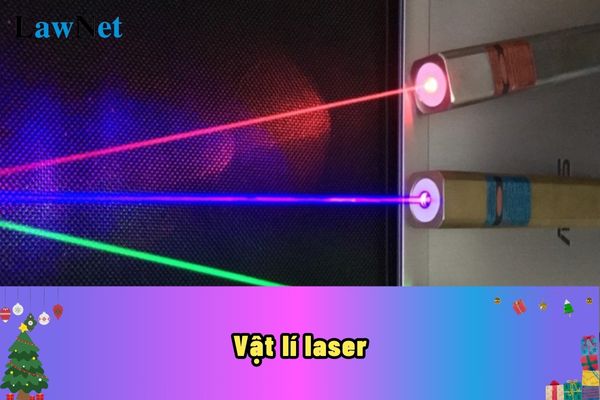What does Laser Physics mean? What are the characteristics of Physics in the General Education Program 2018 in Vietnam?
What does Laser Physics mean?
Laser physics is a branch of physics that studies the phenomenon of stimulated emission, the operating mechanism of lasers, and the applications of laser beams in various fields of science and technology.
|
What does Laser Physics mean? What is a Laser? |
Note: The information about Laser Physics is for reference purposes only./.

What does Laser Physics mean? What are the characteristics of Physics in the General Education Program 2018 in Vietnam? (Image from the Internet)
What are the characteristics of Physics in the General Education Program 2018 in Vietnam?
Under Section 1 of the General Education Program for Physics issued with Circular 32/2018/TT-BGDDT, the characteristics of Physics in the General Education Program 2018 in Vietnam are as follows:
Physics is a science that studies the simplest and most general forms of matter movement and their interactions.
In general education schools, physics education is implemented at all three educational levels with different depths.
In the basic education phase (elementary and lower secondary levels), the physics education content is integrated into the subjects: Natural and Social (grades 1, 2, 3); Science (grades 4, 5); Natural Science (from grades 6 to 9).
In the career orientation education phase (upper secondary level), Physics is a subject in the Natural Sciences group, chosen based on students' aspirations and career orientation. Students with career orientation needing to apply extensive physics knowledge and skills are offered additional study modules. Physics aids students in further developing the qualities and capacities formed in the basic education phase, providing the opportunity to initially identify their true capabilities and strengths, fostering a positive attitude towards the subject. Based on the foundational content provided to students during the basic education phase, the General Education Program for Physics chooses to develop the most essential and practical issues, while focusing on issues with high application value as the basis for many technical, scientific, and technological fields.
Experiments and practical work play a particularly important role in forming concepts, laws, and physical statutes. Therefore, the General Education Program for Physics emphasizes training students to explore the properties of physical objects through experiments and practice topics from various perspectives.
The General Education Program for Physics values the ability to apply the learned knowledge and skills to explore and solve practical issues to a certain extent, meeting the demands of life; while ensuring the development of physics competencies—a manifestation of natural science competencies—and simultaneously meeting the career orientation needs of students.
Through the General Education Program for Physics, students form and develop a scientific worldview; cultivate self-confidence, honesty, and objectivity; appreciate the beauty of nature; develop a love for nature, pride in their homeland's nature; respect natural laws, cherish, preserve, and protect nature, and respond to nature appropriately to meet the requirements of sustainable development; and simultaneously form and develop self-control and self-learning competencies, communication and cooperation skills, and problem-solving and creativity.
What are the 02 objectives of the General Education Program for Physics in Vietnam?
Under Section 1 of the General Education Program for Physics issued with Circular 32/2018/TT-BGDDT, the two objectives of the General Education Program for Physics are as follows:
Objective 1. Along with other subjects and educational activities, help students form and develop the essential qualities and general competencies specified in the overall curriculum.
Objective 2. Help students form and develop physics competencies, with the following manifestations:
- Acquire fundamental knowledge and skills in: physical system models; energy and waves; force and field;
- Apply some scientific process skills to explore and solve problems from a physics perspective;
- Apply some knowledge and skills in practice, interact with nature in a manner suitable for societal sustainable development requirements and environmental protection;
- Recognize their own abilities and strengths, orient career choices, and have a study and training plan that meets the demands of career orientation.

